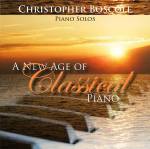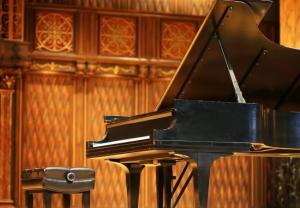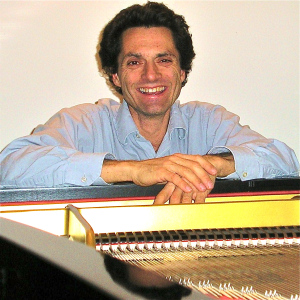 In his previous album, Floating On A Melody, which I had the pleasure of writing about Christopher Boscole featured his original impressionistic piano compositions. However, on his latest release entitled “ A New Age Of Classical Piano,” he turns his creative focus to interpreting a sampling of works by some of the greatest classical composers the world has known. This is a project that has been years in the making for Christopher, although I found it intriguing that he actually worked on this recording and his last one at the same time. As he describes it: “I would take a break from one or the other, alternating between recording classical and original compositions until the boundaries became blurred into just pure music…each would influence and be inspiration to the other, crossing the boundaries of time and musical space.” Another thing I found interesting about Christopher is that while he is highly regarded for his old-school highly detailed musical composition and craftsmanship, he is equally adept at total improvising in the moment. He is able to draw on his education, which includes Bachelor’s and Master’s degrees in Music, as well as on his own intuition and inner guidance which he calls “Presents of Angels,” to describe what he sees as the miracle of this improvisational music. From neo-classical to jazz, new age music, and more, Christopher is full spectrum artist. In addition to his many musical influences, his creativity is also informed by his love of nature and avid interest in both sailing and photography.
In his previous album, Floating On A Melody, which I had the pleasure of writing about Christopher Boscole featured his original impressionistic piano compositions. However, on his latest release entitled “ A New Age Of Classical Piano,” he turns his creative focus to interpreting a sampling of works by some of the greatest classical composers the world has known. This is a project that has been years in the making for Christopher, although I found it intriguing that he actually worked on this recording and his last one at the same time. As he describes it: “I would take a break from one or the other, alternating between recording classical and original compositions until the boundaries became blurred into just pure music…each would influence and be inspiration to the other, crossing the boundaries of time and musical space.” Another thing I found interesting about Christopher is that while he is highly regarded for his old-school highly detailed musical composition and craftsmanship, he is equally adept at total improvising in the moment. He is able to draw on his education, which includes Bachelor’s and Master’s degrees in Music, as well as on his own intuition and inner guidance which he calls “Presents of Angels,” to describe what he sees as the miracle of this improvisational music. From neo-classical to jazz, new age music, and more, Christopher is full spectrum artist. In addition to his many musical influences, his creativity is also informed by his love of nature and avid interest in both sailing and photography.
As mentioned, the songs on this new album (except for two) are interpretations of compositions by icons of classical music. The first four tracks pay homage to Claude Debussy. Appropriately, the first piece is “Arabesque No. 1.” The term “arabesque” as it relates to music is defined as: “a passage or composition with fanciful ornamentation of the melody.” This piece certainly fits the description. According to the album’s liner notes: “The Arabesques were very early impressionistic pieces of music, following the French visual art form. Debussy seems to wander through modes and keys, and achieves evocative scenes through music. His view of a musical arabesque was a line curved in accordance with nature, and with his music he mirrored the celebrations of shapes in nature made by the Art Nouveau artists of the time.” Interestingly, the connection of music, art, and nature finds a parallel with Christopher’s own inspirations. This was an early composition of Debussy written in the late 1800’s, and I enjoyed Christopher’s interpretation of if very much. Following is another piece by the same composer, entitled “Doctor Gradus ad Parnassum.” Equally ornate, especially in the beginning, Christopher’s piano virtuosity is astounding as he launches into this extremely complex and quick tempo composition. The pace slows considerably on track 3, “Clair de Lune,” one of Debussy’s most well known movements. Like the moonlight the song is named for, Christopher’s playing illuminates the elegance of this gorgeous composition. As if lost in a dream, the final homage to Debussy entitled “Reverie,” drifts peacefully along and highlights Christopher’s ability to excel on a more understated theme in comparison with his previously mentioned more ornate playing.
classical music. The first four tracks pay homage to Claude Debussy. Appropriately, the first piece is “Arabesque No. 1.” The term “arabesque” as it relates to music is defined as: “a passage or composition with fanciful ornamentation of the melody.” This piece certainly fits the description. According to the album’s liner notes: “The Arabesques were very early impressionistic pieces of music, following the French visual art form. Debussy seems to wander through modes and keys, and achieves evocative scenes through music. His view of a musical arabesque was a line curved in accordance with nature, and with his music he mirrored the celebrations of shapes in nature made by the Art Nouveau artists of the time.” Interestingly, the connection of music, art, and nature finds a parallel with Christopher’s own inspirations. This was an early composition of Debussy written in the late 1800’s, and I enjoyed Christopher’s interpretation of if very much. Following is another piece by the same composer, entitled “Doctor Gradus ad Parnassum.” Equally ornate, especially in the beginning, Christopher’s piano virtuosity is astounding as he launches into this extremely complex and quick tempo composition. The pace slows considerably on track 3, “Clair de Lune,” one of Debussy’s most well known movements. Like the moonlight the song is named for, Christopher’s playing illuminates the elegance of this gorgeous composition. As if lost in a dream, the final homage to Debussy entitled “Reverie,” drifts peacefully along and highlights Christopher’s ability to excel on a more understated theme in comparison with his previously mentioned more ornate playing.
Of particular interest to me was “Gymnopedie No.1″ by Erik Satie since the series of three pieces is considered a precursor to modern ambient music. Christopher describes them as “gentle yet somewhat eccentric pieces”, and “melancholy yet hauntingly beautiful” as the melodies use deliberate, but mild dissonances against the harmony. Quite a different era and feel is reflected in the next two compositions by Chopin, “ Prelude No.1” and “Mazurka Op 17 No. 4″. Just as Debussy was greatly influenced by Chopin, Chopin himself drew great inspiration from Mozart and Bach. And one of Bach’s most loved pieces, “ Prelude from the Well-Tempered Clavichord” follows the previous tracks by Chopin. According to Christopher, “This is the best known piece from Bach’s collection of ‘Twenty-four Preludes and Fugues’ that are generally regarded as being among the most influential works in the history of Western classical music.”
 After hearing 8 tracks of music written by some of the world’s greatest composers, I was intrigued to hear how Christopher’s original composition would compare. Describing the piece in his own words, he shares: “Following in Bach’s footsteps, using the same arpeggiatted style, propelling this musical journey through all 12 key centers to return back to restating the main theme again, only to find a surprise ending in Major as the sun shines bright at the end of the day.” I will be the first to admit that I am far from being an authority on classical or neoclassical music, but I found this piece to be quite compelling and emotionally evocative. I can’t say on a technical or compositional level how it equates with the Masters, but in a purely visceral way, I was indeed moved by it, and dare I say that it was perhaps my favorite track on the album. I also appreciated the spaciousness and cinematic quality of Christopher’s other original track, “Playing Rain.” To my ear, this impressionistic piece had as much of feel of new age music as neoclassical at times, recalling the likes of artists like George Winston, David Lanz, or Liz Story. The album concludes with musical fireworks as Christopher once again reveals his virtuosity on Chopin’s “Minute Waltz Op 64 No.1 – a performance that is sure to leave listeners in awe.
After hearing 8 tracks of music written by some of the world’s greatest composers, I was intrigued to hear how Christopher’s original composition would compare. Describing the piece in his own words, he shares: “Following in Bach’s footsteps, using the same arpeggiatted style, propelling this musical journey through all 12 key centers to return back to restating the main theme again, only to find a surprise ending in Major as the sun shines bright at the end of the day.” I will be the first to admit that I am far from being an authority on classical or neoclassical music, but I found this piece to be quite compelling and emotionally evocative. I can’t say on a technical or compositional level how it equates with the Masters, but in a purely visceral way, I was indeed moved by it, and dare I say that it was perhaps my favorite track on the album. I also appreciated the spaciousness and cinematic quality of Christopher’s other original track, “Playing Rain.” To my ear, this impressionistic piece had as much of feel of new age music as neoclassical at times, recalling the likes of artists like George Winston, David Lanz, or Liz Story. The album concludes with musical fireworks as Christopher once again reveals his virtuosity on Chopin’s “Minute Waltz Op 64 No.1 – a performance that is sure to leave listeners in awe.
I have a great deal of respect for anyone who can undertake iconic classical music such as this and perform it respectfully, yet with a bit of his or her own flavor. What makes Christopher an even more formidable pianist is his ability to be equally adept at purely improvisational music. Knowing that he is also skilled in the jazz idiom makes me hope that his next release will explore that musical terrain. But this album, “A New Age of Classical Piano,” beyond being a sterling listening experience, was also for me, an educational one as well. Hearing the works of so many great composers in one place and following along with Christopher’s program notes, opened my ears and my mind to the differences in style and influences between them. Christopher deserves a lot of credit for this recording and it serves as brilliant showcase for his phenomenal talent. The only thing left to say is… bravo!

